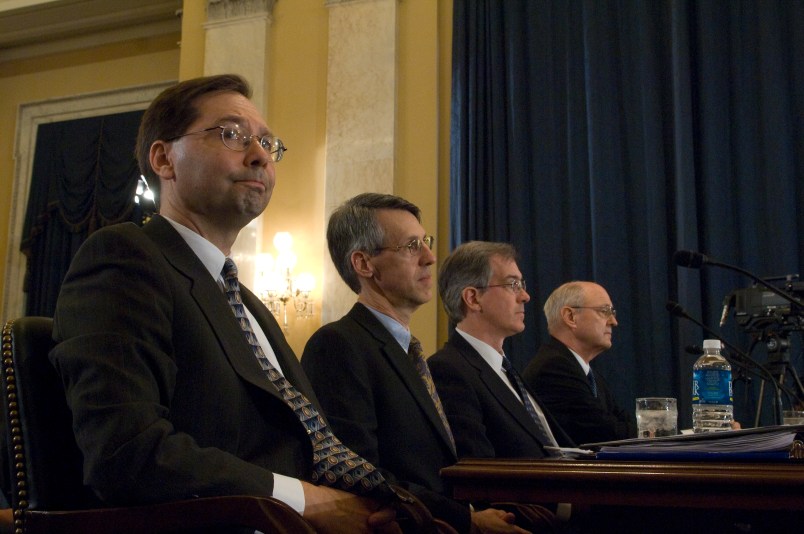A prominent voter fraud alarmist who had prepared a report defending Kansas’ proof-of-citizenship law admitted in testimony Friday that he did not investigate the circumstances surrounding the registrations of a handful of non-citizens that were central to his allegations.
The witness, Hans von Spakovsky, relied on a spreadsheet provided to him by the state. The spreadsheet showed that in Kansas’ second most populous county, there were only 38 alleged cases of non-citizens registering or attempting to register to vote in the last two decades. That spreadsheet, which also showed that only five of those non-citizens cast votes, had already come under extreme scrutiny earlier in the trial.
Read the latest reporter’s sum-up (Prime access) on voting rights »
“I did not personally examine each registration form,” von Spakovsky said, under cross-examination from Dale Ho, the ACLU’s lead attorney in the case.
The ACLU’s expert witness, Lorraine Minnite, had done so. And much of her testimony was spent picking apart the spreadsheet for mischaracterizing what appeared to be administrative error or confusion by the non-citizen, when one looked at their registration form. (One of the alleged non-citizens, for instance, did not check the box confirming they were a citizen).
Kansas’ cross-examination of Minnite focused on her definition of voter fraud, and on how courts had previously treated her testimony. That latter line of questioning was abandoned, however, when Kansas attorney Garrett Roe had trouble staying within trial rules.
Ho, meanwhile, picked apart von Spakovsky’s report, which claimed that Kansas had a “problem” of non-citizens registering to vote. He pressed von Spakovsky on the evidence he was using to support his allegations, and pointed out when von Spakovsky omitted relevant context. When van Spakovsky attempted to dodge Ho’s questions, U.S. District Judge Julie Robinson intervened to get him to answer.
Ho’s questioning of von Spakovsky was intense. He at times gestured at the witness, and at one point Kobach objected, saying Ho was “aggressively pointing” at von Spakovsky.
“Mr. Ho, I think you should tone it down,” Robinson said.
Early in his questioning, Ho brought up von Spakovsky’s allegation in his report that “ineligible voters could make the difference in a close election.”
Von Spakovsky admitted that he couldn’t cite a single case where non-citizen voting changed the outcome of an election.
Ho then turned to a Florida NBC News affiliate’s story von Spakovsky cited in his report. The story alleged that 100 people who had claimed to have been non-citizens on jury forms were registered to vote in Collier County. Follow up investigations clarified that 35 of those registrants were in fact U.S.citizens.
Did von Spakosvky look into any follow-ups on the original, or seek to correct his report given the more recent reporting?
The best that von Spakovsky could offer was that it was corrected in his deposition in the case.
Another claim in von Spakovsky’s report was that 3 percent of people called to jury duty in a court district that used voter registration for its jury pool were not citizens. Von Spakovsky had pulled that statistic from a Government Accountability Office (GAO) report. Ho introduced the GAO report into evidence to show that the court district von Spakovsky chose had the highest percentage of non-citizens of all the court districts included in the GAO report.
The GAO report looked at eight court districts: Four had no cases of potential jurors being disqualified for not being citizens, while one had less than 1 percent and the other two around .1 percent of potential jurors claiming to be non-citizens.
Ho moved on from the report itself to claims that von Spakovsky — and Kobach — have made in op-eds, that Somali nationals voting illegally tipped a state legislative race in Missouri.
A state court ruling found that there was no fraud in the race.
Von Spakovsky said he “was not aware of that” when he wrote his op-ed. Asked if he attempted to retract the claim, von Spakovsky said he didn’t recall when he found out.
Parts of the report von Spakovsky offered as part of his expert testimony had been already thrown out by the judge, who found that von Spakovsky was not qualified to testify on a survey he had cited in defending the proof-of-citizenship efforts.
For his efforts, von Spakovsky was paid $5,000 by the state of Kansas.







The number of instances they are finding is tiny. To put it into perspective I’d like to know what proportion of elections are decided by fewer than 50 or 100 votes. My feeling is that races that close are pretty rare but I’d like to see the data.
Secretaries of state (in this case, mainly of CA) should have the right to sue Trump for slander regarding unsubstantiated claims of voter fraud.
In his defence, it was Betsy DeVos who did the calculations (" 1 + .1 + .1 percent = 3 percents")
People say Martin Skreli has a punchable face. I think Von Spakovsky is worse. My palm practically itches to slap him.
Five grand for a couple days of blather. Wingnut welfare in action. (And don’t say he spent time preparing, because if he did, Kansas deserves a refund.)
And, of course, as usual: if votes by ineligible voters could make the difference in a close election, so could the potential votes of eligible voters who are prevented from voting. But somehow never considered a problem by these evil twerps.